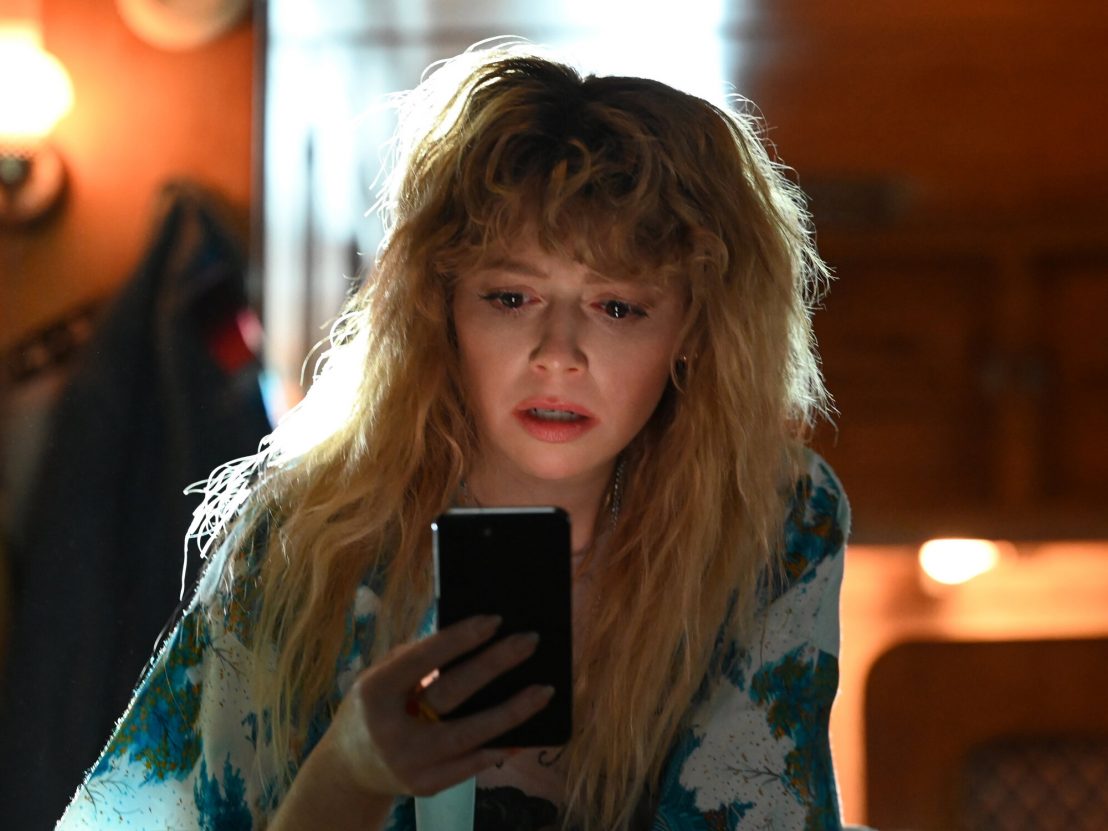
“I gotta say, it sounds like I was born in the wrong time.” Uttered by human lie detector Charlie Cox, these lines might as well refer the actor who plays her: the throaty-voiced, wild-haired Natasha Lyonne. Lyonne’s coolness lies in her resistance to trends – high-waisted jeans, vocal fry, she’ll have none of it – and, paradoxically, that’s the source of her versatility. There is no “wrong time” for Lyonne. One imagines she would be as comfortable, or coolly uncomfortable, in a Cassavetes film or a 1930s comedy of remarriage as she proves to be in a mind-bending time-travel dramedy on Netflix. When Lyonne’s talents are pooled with those of showrunner Rian Johnson, a writer-director constantly referencing, looking back toward, or playfully burning down Hollywood legend, the result is bound to be a media-literate blast.
Poker Face is Lyonne and Johnson’s first collaboration, and it is a gratifying throwback to the network howcatchem (as opposed to the prestige whodunnit), as reinvented for the streaming millennial on-the-go. Snarky, queasy Search Party it is not: Columbo is its most obvious “inverted detective story” precursor. In Poker Face, as in Columbo, episodes begin with a 10 to 15-minute opener, showcasing some big-name guest stars and culminating in a murder. Then the action backtracks, and the audience sees how street-smart drifter Charlie – a sleuth who is definitely “not a cop” – fits into the story as initially presented. Charlie’s gift for sniffing out liars is matched only by her “Lady Gallahad” instincts, which is to say, she can’t leave killers well enough alone. After all, by her own account, she knows when people are lying, but she doesn’t always know why.
This is a show that knows what it is, and what it isn’t. Throughout the series, references to its mystery media compatriots abound: the hokey procedural sitcom (comically titled “Spooky and the Cop”), the murder podcast, and the Nordic snow noir. Poker Face, like its main character, offers an original collection of talents, not the least of which is a lead who manages to be affable without losing her edge, not to mention a keen sense of place and mood. Much of the show takes place “on the road,” as Charlie travels from town to town. (Her talent for rooting out liars with plenty to lose, together with her keen sense of justice, has earned her some dangerous enemies.) Lonely radio deejays, alienated mechanics, disillusioned retail employees: these are people who would rather remake their world through falsehood than look around, plainly, at their lot. Poker Face treats the accompanying stretches of emotional and literal desert as Charlie does—with warmth, care, and humor.
The show is at its best when it leans into its retro vibe and falters when it tries to be explicitly hyper-contemporary. The “place that time forgot” atmosphere says more about our cultural moment than some toothless MAGA jokes. (To enjoy how sharp Johnson’s satire can get, switch over to Netflix for Glass Onion.) Of the six episodes shared with critics (there being ten in total), the superior storylines have twists rooted in character rather than coincidence.

The pilot, guest starring Adrian Brody as the slick idiot son of a casino owner, sets up the show’s vibe: delightfully tense staring contests, shot in medium close-up, in a milieu of pinky rings and geometric carpets that probably haven’t been cleaned since the 1970s. It probably has the single best ending; the fifth episode, set at a seniors’ facility and co-starring Judith Light and S. Epatha Merkerson (both fabulous), as well as Simon Helberg, is the funniest and most shocking. Finally, Ellen Burstyn turns in a killer performance of a killer performance in the sixth episode, with a script that reminds the audience that Charlie doesn’t just know when you’re lying. She knows, really knows, when you’re telling the truth, which is even more intimate and high-stakes. The pathos sure can sneak up on you, even in the coziest of cozy mysteries.
A comforting, smart return to an older form of television that may well be coming back (for all any of us know), Poker Face affords the unique, unhurried pleasures of the case-of-the-week dramedy, sans the non-stop sex crimes of the Dick Wolf franchises or the familiar rituals of the police procedural. (And you can forget about DNA evidence—Charlie works analog.) Come, rather, to marvel at the nuances of amateur investigative work, to keep up rather than to outpace the detective; come to watch the performances, or, as Charlie does, to watch the liars lie.
Just one more thing, as Detective Frank Columbo says: Peacock intends to drop the first four at once, then once a week. Each episode is self-contained, so pace them out for maximum enjoyment and minimum redundancy. To invite you to savor or to ration Poker Face seems a bit much, so I’ll say this: travel back in time, and “tune in.”
Published 25 Jan 2023

Rian Johnson does his best Agatha Christie impression in this riotous, star-packed homage to the classic whodunnit.

Benoit Blanc enters the canon of iconic movie characters with Rian Johnson’s second foray into whodunit (nu-dunit?) territory.

The writer/director of Glass Onion talks musicals, murder mysteries, and the sartorial secrets of master detective Benoit Blanc.